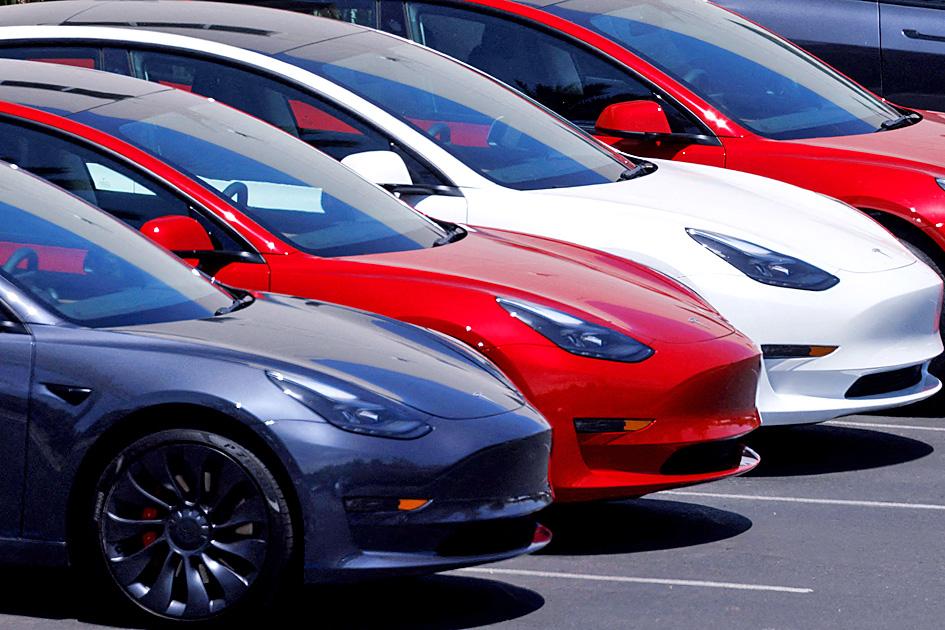Tesla Inc laid off hundreds of workers on its Autopilot team as the electric-vehicle maker shuttered a California facility, people familiar with the matter said.
Surprisingly, the majority of those who were let go were hourly workers, the people said.
As recently as last week, Tesla chief executive officer Elon Musk had outlined plans to cut 10 percent of salaried staff, but said he would be increasing hourly jobs.

Photo: Reuters
Teams at the San Mateo office were tasked with evaluating customer vehicle data related to the Autopilot driver-assistance features and performing so-called data labeling.
Many of the staff were data annotation specialists, all of which are hourly positions, one of the people said.
About 200 workers were let go in total, the people said.
Prior to the cuts, the office had about 350 employees, some of whom were already transferred to a nearby facility in the past few weeks.
Tesla did not immediately respond to a request for comment.
Tesla is trimming its ranks after a surge in hiring in the past few years. The company, now based in Austin, Texas, had grown to about 100,000 employees globally as it built new factories in Austin and Berlin.
Musk caught workers by surprise earlier this month when he said layoffs would be necessary in an increasingly shaky economic environment.
He said in an interview with Bloomberg that about 10 percent of salaried employees would lose their jobs over the next three months, although the overall headcount could be higher in a year.
The electric-vehicle market leader’s downsizing efforts have focused on areas that grew too quickly. Some human resources workers and software engineers are among those who have been laid off, and in some cases, the cuts have hit employees who had worked at the company for just a few weeks.
Those affected by the latest move worked on one of the higher-profile features in Tesla vehicles.
In job postings, Tesla has said that labeled data is the “critical ingredient for training powerful Deep Neural Networks, which help drive the Tesla vehicles autonomously.”
Staffers in Buffalo, New York, and San Mateo spent hours labeling images for road vehicles and the environment they navigate, such as street signs and traffic lanes.

Sweeping policy changes under US Secretary of Health and Human Services Robert F. Kennedy Jr are having a chilling effect on vaccine makers as anti-vaccine rhetoric has turned into concrete changes in inoculation schedules and recommendations, investors and executives said. The administration of US President Donald Trump has in the past year upended vaccine recommendations, with the country last month ending its longstanding guidance that all children receive inoculations against flu, hepatitis A and other diseases. The unprecedented changes have led to diminished vaccine usage, hurt the investment case for some biotechs, and created a drag that would likely dent revenues and

Macronix International Co (旺宏), the world’s biggest NOR flash memory supplier, yesterday said it would spend NT$22 billion (US$699.1 million) on capacity expansion this year to increase its production of mid-to-low-density memory chips as the world’s major memorychip suppliers are phasing out the market. The company said its planned capital expenditures are about 11 times higher than the NT$1.8 billion it spent on new facilities and equipment last year. A majority of this year’s outlay would be allocated to step up capacity of multi-level cell (MLC) NAND flash memory chips, which are used in embedded multimedia cards (eMMC), a managed

CULPRITS: Factors that affected the slip included falling global crude oil prices, wait-and-see consumer attitudes due to US tariffs and a different Lunar New Year holiday schedule Taiwan’s retail sales ended a nine-year growth streak last year, slipping 0.2 percent from a year earlier as uncertainty over US tariff policies affected demand for durable goods, data released on Friday by the Ministry of Economic Affairs showed. Last year’s retail sales totaled NT$4.84 trillion (US$153.27 billion), down about NT$9.5 billion, or 0.2 percent, from 2024. Despite the decline, the figure was still the second-highest annual sales total on record. Ministry statistics department deputy head Chen Yu-fang (陳玉芳) said sales of cars, motorcycles and related products, which accounted for 17.4 percent of total retail rales last year, fell NT$68.1 billion, or

In the wake of strong global demand for AI applications, Taiwan’s export-oriented economy accelerated with the composite index of economic indicators flashing the first “red” light in December for one year, indicating the economy is in booming mode, the National Development Council (NDC) said yesterday. Moreover, the index of leading indicators, which gauges the potential state of the economy over the next six months, also moved higher in December amid growing optimism over the outlook, the NDC said. In December, the index of economic indicators rose one point from a month earlier to 38, at the lower end of the “red” light.